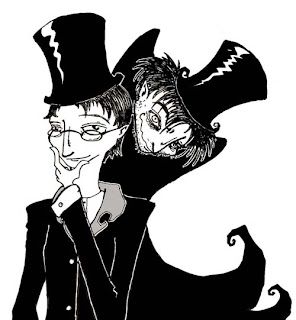Greetings, blogosphere. Today is the first day of one of my favorite months! October is a fantastic month. The beginning starts off relatively warm, and the temperature continually drops off to accent the falling leaves of orange and red as the month closes up with one of my favorite holidays.
This is going to be a happily busy month for me. I've been cast in a play based off of one of my favorite novellas: Robert Louis Stevenson's The Strange Case of Dr. Jekyll and Mr. Hyde. I play Mr. Gabriel John Utterson, Jekyll's lawyer who has a bit of a dark side. I really love the part I'm in, and I'm blessed to be with such talented actors.
For those that are unfamiliar with the plot of the novella, Dr. Henry Jekyll is a doctor whose work is specialized in understanding what Jekyll calls "the primitive duality of man". His work begins to consume him as he makes a breakthrough and develops an alternative personality named Edward Hyde, who embodies the evil side of Jekyll. Hyde goes on continuous crime sprees, and grows more powerful each time he emerges to the point where Jekyll begins to lose control. I won't spoil the ending, though!
"Man is not truly one, but truly two!" Jekyll makes this claim numerous times. The dual nature of man is one of good and one of evil. "He who has the two forces of good and evil under such control that the good always balances the evil is indeed blessed," he states in the script of my play.
I was stricken with curiosity (as I do more and more each day) on this notion. Is the human mind so easily dichotomized into good and evil? This isn't an uncommon idea. The history of art, religions, and literature throughout the world is fraught with this concept of good combating against and (most of the time) triumphing over evil. Why is this so?
Well, it makes for a good story. The concept of good defeating evil plays right into the human sense of morality as well as the natural desire found in humans for revenge. However, this conflict is most often between two separate parties, not between two sides of the same person.
Regardless, we need to take it back to basics. Definitions of good and evil. Are there really such things, or are they simply social constructs? Is there such a thing as universal morality, or does society bring us up to think they are? After many debates, discussions, and meditations, I've come to believe that even if it is a social construction, it's a necessary one put in place in order to benefit society rather than the individual.
The conflict of what benefits society rather than the individual, I think, strikes at the core of what "good" and "evil" are. Good is generous, giving, polite, positive. It is based on the community. Evil is selfish, vindictive, rude, and negative. Good is selfless, Evil is selfish.* So, it all comes down to who you choose to work for the benefit of.
If you have any input, I appreciate it if you put something in the comments. Is there such a thing as Evil? What constitutes Good? Is everything just Neutral? Does it even matter?
*This is why, when I play DnD, I tend to reject the Alignment System's Good-Evil axis and replace it with the Communal-Individual axis. Sure, "Chaotic Communal" and "Neutral Individual" don't really sound as awesome as "Chaotic Good" and "Neutral Evil", but I think it better (not perfectly, but better) reflects the human psyche and motivations.
If you like my writing, you can join the site to the right of the page, like Speaking with Storms on Facebook or follow me on Twitter and Google+ . If you have questions or just want to chat, I'm on Formspring too!
Thanks for reading. Stay human, my friends.


No comments:
Post a Comment